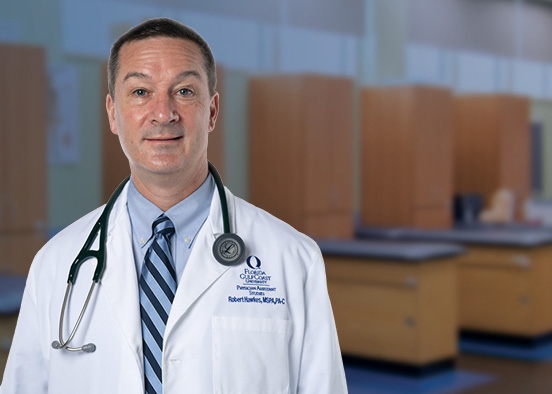
Besides making sure students have as complete an educational experience as possible during the COVID-19 pandemic, Florida Gulf Coast University faculty and staff also have played important roles in the response to this crisis.
Along with healthcare workers and teachers, mental health counselors and scientists, engineers and entrepreneurs — they are part of a legion of ordinary people who became extraordinary in challenging times and demonstrated the impact of FGCU in communities near and far.
Few faculty have been as sought after and accessible during the pandemic as Robert Hawkes. The director of physician assistant studies in the Marieb College of Health & Human Services, Hawkes has represented FGCU authoritatively at the forefront, breaking down and analyzing the healthcare aspects of the situation for the public.
Already a frequent go-to source for area reporters on health topics well before coronavirus, Hawkes has participated in locally televised panel discussions and offered expert analysis on COVID-19 for every major media outlet in the region. Demand for his insights have taken FGCU’s presence into the Tampa and West Palm Beach markets and even landed him on CBS2 New York last December along with Alise Bartley, director of FGCU’s Community Counseling Center.
Hawkes was ready for his proverbial close-up. At each phase of the pandemic, Hawkes has stepped up and addressed critical issues on everyone’s minds: the importance of social distancing, wearing masks and self-quarantining; why flu shots are more important than ever; the effectiveness of contact tracing; how vaccines are formulated and produced.
“I feel it is important to break down the important topics in an easy-to-understand, conversational format,” Hawkes said. “I try to take the research data available and present the topic in a concise way that the viewer or reader can understand.
“Marieb College and FGCU have areas of expertise to share, and I am pleased that we are seen as a community resource to share critical information with the local media,” he continued. “The media exposures will create additional awareness of the essential requirements of healthcare in our region.”
Indeed, Hawkes and his colleagues in Marieb College of Health & Human Services have offered unprecedented service to the community on several fronts at a time when it’s needed more than ever: communicating the evolving data and science around COVID-19; calming fears with the latest information on prevention and treatment; providing comfort and healing in a time of widespread suffering and loss.
All this while maintaining their primary roles as teachers and administrators.
In Hawkes’ case, that involves overseeing the master’s in physician assistant studies (MPAS) degree program that FGCU launched in fall 2017 and that now shapes intentionally small cohorts of graduates essential to the battle against public health threats like COVID-19. It’s the personalized educational training afforded by such limited class sizes that not only attracts students, but prepares them to hit the field running.
“We admit only 20 students per year, which allows us to individualize the students’ experiences,” Hawkes said. “We also focus on team-based and problem-based learning exercises.”
The results? “Our preceptors and clinical partners have commented how well prepared our students are for their clinical rotations,” Hawkes said. “We have an experienced faculty who bring knowledge and experiences to the classroom. Many of our recent graduates received job offers while on clinical rotations.”
The program’s solid success in such a short span, as well as Marieb College’s prominent role in responding to varied facets of the pandemic, position FGCU well to play a critical part on the frontlines of whatever public health crisis may come in the future. As for Hawkes, his research interests already revolve around emergency medicine and preventative healthcare.
“The pandemic has changed the way we function as a society,” Hawkes said. “We are continuing to learn how to change our daily routines. Once the current pandemic subsides, we will continue to utilize social distancing in larger settings, and become more aware to wash our hands more frequently. Also, we have all become more proficient in using new technology to communicate with our students and families.”[/vc_column_text][vc_column_text]
Support the frontlines
This is part of a series of stories spotlighting FGCU students, faculty and alumni making an impact during the pandemic.
 By investing in a scholarship or a program at FGCU, you can empower more individuals like them to make a difference where it matters most — on the frontlines. For information on how you can help, call FGCU Advancement at 239-590-1067, or visit FGCU on the Frontlines to see more stories and give online.[/vc_column_text]
By investing in a scholarship or a program at FGCU, you can empower more individuals like them to make a difference where it matters most — on the frontlines. For information on how you can help, call FGCU Advancement at 239-590-1067, or visit FGCU on the Frontlines to see more stories and give online.[/vc_column_text]